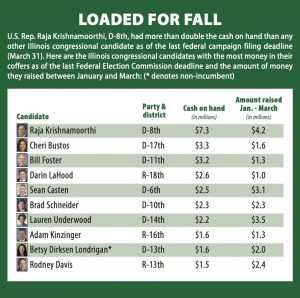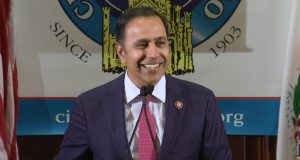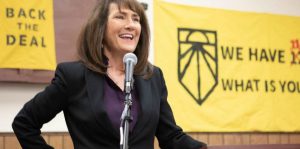Illinois congressional candidates have money to make November run
By Kevin Beese Staff Reporter — April 26, 2020 Illinois’ 3rd Congressional District has been in Democratic hands for more than 40 years and Marie Newman plans to keep it that way.
Illinois’ 3rd Congressional District has been in Democratic hands for more than 40 years and Marie Newman plans to keep it that way.
However, after beating eight-term incumbent Dan Lipinski in the Democratic primary, much of her staff moved on to help other campaigns. Then came the coronavirus.
Her campaign fund, as of the end of March, had less than $100,000 in it. She knows she will need to ramp up fund-raising efforts again before the General Election in November. However, she has no idea when that will be.
“I do need to fundraise at some point, but there is no sense in the current conditions to ask for a dime,” Newman said. “But, yes, at some point, I will have to raise money.”
She said with coronavirus concerns impacting everyone’s life, few people are focusing on the November elections right now.
“To even think about fundraising is hard when everywhere you look there are front-liners needing to be protected,” Newman said.
Federal Election Commission records show that Newman took in $2 million between January and March and spent $1.9 million in her successful campaign to top Lipinski.
Since that primary victory, Newman said she has been working to assist area residents and community groups needing assistance during the new coronavirus pandemic — and doing it on a shoestring budget.
“We are being as frugal as possible,” the Oak Lawn resident said.
Believed to have a safe General Election — 110,000 of the 127,000 residents who voted in the 3rd Congressional primary pulled Democratic ballots — Newman will likely not be getting much financial support from the national Democratic Party. National money will go toward keeping new incumbents like Sean Casten in Illinois’ 6th Congressional District and Lauren Underwood in the 14th District safe.
Should Newman need financial help beyond her own fundraising efforts, she could reach out to three Democratic congressional incumbents in Illinois who each has more than $3 million on hand and are not expected to spend anywhere near that amount in their re-election campaigns.
U.S. Rep. Raja Krishnamoorthi, D-8th, had more than $7 million on hand as of March 31. His Republican challenger, Joseph Hantsch of Wood Dale, doesn’t even have a campaign website and hasn’t filed FEC paperwork that was required when he tried to run for the seat in 2016 but was removed from the ballot prior to the Republican primary.
Krishnamoorthi also had the biggest intake of all Illinois’ congressional candidates for the first quarter of 2020. He brought in $4.2 million in contributions.
Krishnamoorthi and Underwood both ranked in the top 25 congressional representatives nationally for money brought in during the first quarter of 2020. Underwood brought in $3.5 million.
Both Cheri Bustos, D-17th, and Bill Foster, D-11th, had more than $3 million on hand at the end of March ($3.3 million and $3.2 million, respectively). The Foster campaign, however, did have $1 million in debts and loans still unpaid at the end of March. But Foster’s opponent in November, Rick Laib, had only $1,059 on hand as of March 31 and still owed $1,500 in debts and loans, making it is hard to imagine Foster spending more than a fraction of his $2 million-plus surplus on this fall’s General Election.
Here is a look at campaign finances in the 18 congressional districts in the state:
1st District: Democrat Bobby Rush had $39,533 on hand as of March 31. However, his campaign had debts and loans of $25,589 still outstanding.
His campaign took in $226,705 and spent $274,812 in 2020’s first three months.
Rush’s biggest contributors between Jan. 1 and March 31 were 10 $5,000 donors, including three trades organization — Machinists, Laborers, and the United Association of Journeymen and Apprentices of the Plumbing, Pipefitting and Sprinkler Fitting Industry.
Rush’s Republican opponent, Philanse White, had not filed campaign-finance paperwork as of March 31.
2nd District: Democrat Robin Kelly had $874,856 on hand at March’s conclusion.
Her campaign took in $1 million and spent $661,149 in the year’s first three months.
Kelly’s biggest contributor from Jan. 1 to March 31 was Illinois Democrats 2020, which gave her $14,142.
Her Republican opponent, Theresa Raborn, had not filed campaign-finance paperwork as of March 31.
3rd District: Democrat Marie Newman had $90,073 on hand at the end of March.
Her campaign took in $2 million and spent $1.9 million during the first three months of the year.
Newman’s biggest contributions during the first quarter were 12 $5,000 donors, half of which were political action committees.
Her Republican opponent, Mike Fricilone, had $701 on hand at the end March, but the campaign still owed $14,000 in debts and loans.
Fricilone’s campaign took in $33,590 and spent $32,888 during the first three months of 2020.
He was his own biggest supporter, loaning his campaign $4,000 on two occasions — and $14,000 in total — during the first quarter.
4th District: Democrat Jesus “Chuy” Garcia had $168,533 on hand as of March 31.
His campaign took in $573,260 and spent $419,796 during the year’s first three months.
He had eight $5,000 donors — all trades unions — during the first quarter.
He has no Republican opponent so far. Christopher Lasky had filed to run as a Republican, but died in December.
“Discussions are currently underway” to field a Republican candidate, Chris Provenzano of the Cook County Republican Organization said.
5th District: Democrat Mike Quigley had $1 million on hand as of March 31.
His campaign took in $769,077 and spent $537,224 during the first quarter.
Quigley had 14 $5,000 contributions in the first quarter, including two from Wine and Spirits Wholesalers of America and one from Anheuser-Busch.
His Republican opponent, Tom Hanson, has yet to file campaign-financing paperwork as of March 31.
6th District: Democrat Sean Casten had $2.5 million on hand as of March’s end.
His campaign took in $3.1 million and spent $747,091 during the first quarter.
Casten’s biggest campaign contribution during the first three months of 2020 was $25,705 from Canal Partners Media.
His Republican opponent, Jeanne Ives, had $366,221 on hand at the end of March.
Her campaign took in $1.1 million and spent $747,786 from January through March.
Ives’ biggest campaign contributions during the first quarter were $12,500 donations from William Dixon and Barbara Dixon, both of Wheaton.
7th District: Democrat Danny Davis had $339,734 on hand as of March 31.
His campaign took in $366,690 and spent $230,943 during the first quarter.
Davis received 12 $5,000 contributions during the first three months of 2020, half of them from trades unions.
His Republican opponent, Craig Cameron, had yet to be file campaign-financing paperwork as of Mach 31.
8th District: Democrat Raja Krishnamoorthi had $7.3 million on hand as of March 31.
His campaign brought in $4.2 million and spent $1.6 million during the first quarter.
Krishnamoorthi had 32 $5,000 contributions from January through March, including 12 from trades unions.
His Republican opponent, Joseph Hantsch, does not have a campaign website and still has not filed paperwork, according to the Federal Election Commission, from his 2016 run for the congressional seat when he was knocked off the ballot before the primary.
9th District: Democrat Jan Schakowsky had $648,964 on hand as of March 31.
Her campaign took in $1.3 million and spent $1.1 million during the first three months of 2020.
Schakowsky’s biggest campaign contribution from January through March was $29,733 from ActBlue, a political action committee that donated more than $1.3 billion to Democratic candidates in the first quarter.
Her Republican opponent, Sargis Sangari, had $3,260 on hand as of March 31.
His campaign took in $12,275 and spent $9,014 during the first quarter.
Sangari’s biggest contributions from January through March were $1,500 from both Joseph Tamraz of Chicago and the Republican Women of Park Ridge.
10th District: Democrat Brad Schneider had $2.3 million on hand as of March 31.
His campaign took in $2.3 million and spent $1.3 million during the first quarter.
Schneider received 22 $5,000 contributions from January through March, including seven from labor organizations.
His Republican opponent, Valerie Ramirez Mukherjee, had $70,296 on hand as of March 31. However, her campaign had debts and loans totaling $130,365 as of the filing deadline.
Her campaign took in $117,844 and spent $47,547 during the first quarter.
She self-funded her campaign with two $50,000 donations — and $102,800 in total — from January through March.
11th District: Democrat Bill Foster had $3.2 million on hand as of March 31. However, the campaign had debts and loans owed of $1 million.
The Foster campaign took in $1.3 million and spent the same amount during the first quarter.
Foster’s top eight contributions from January through March were all from Jannery Montgomery Scott, a financial services firm. The Philadelphia-based company gave Foster a total of $45,347 during those three months.
His Republican opponent, Rick Laib, had $1,059 on hand at the end of March. However, the campaign still owed $1,500 in debts and loans at the end of the first quarter.
Laib took in $8,725 and spent $7,665 from January through March.
His biggest contribution during that stretch was $1,000 from himself.
12th District: Republican Mike Bost had $846,634 on hand as of the end of the first quarter.
His campaign took in $1.3 million and spent $476,000 during 2020’s first three months.
Bost’s biggest contribution from January through March was $55,336 from Take Back the House 2020, a political action committee that provided $44 million to Republican candidates.
His Democratic opponent, Raymond Lenzi, had $3,728 on hand as of March 31.
The Lenzi campaign took in $57,115 and spent $53,387 during the first quarter.
His biggest contribution from January through March was a $4,048 donation he made to himself. He contributed a total of $6,048 to his campaign during that time.
13th District: Republican incumbent Rodney Davis had a tad less cash on hand than his Democratic challenger, Betsy Dirksen Londrigan, at the end of March.
Londrigan had $1.6 million available to Davis’ $1.5 million.
Davis took in $2.4 million and spent $988,032 during the first quarter.
His biggest contribution from January through March was $59,752 from Take Back the House 2020.
Londrigan took in $2 million and spent $481,732 during the first quarter.
Her biggest campaign contribution from January through March came from Illinois Democrats 2020, which gave her $15,733.
14th District: Democrat Lauren Underwood had $2.2 million on hand as of March 31.
She took in $3.5 million and spent $1.3 million during the first quarter.
Her biggest contribution from January through March was $256,233 from House Victory Project 2020.
Her Republican opponent, Jim Oberweis, had $222,309 on hand as of March 31. However, his campaign had unpaid debts and loans of $730,367.
Oberweis brought in $1.6 million and spent $1.4 million during the first quarter.
His biggest contribution from January through March was a $600,000 donation he made to himself. He self-funded his campaign to the tune of $1 million during the three-month period.
15th District: In the race to replace retiring U.S. Rep. John Shimkus, neither candidate had much cash on hand as of March 31.
Republican hopeful Mary Miller had $29,524 available.
Miller brought in $348,033 and spent $318,509 during the first quarter.
Her biggest contribution from January through March was $41,437 from the House Freedom Fund.
Her Democratic opponent, Erika Weaver, had $3,088 on hand as of the end of March.
Weaver took in $6,958 and spent $4,103 from January through March.
No data was available from the Federal Election Commission as to her campaign contributors.
16th District: Republican Adam Kinzinger had $1.6 million on hand as of March 31.
His campaign took in $1.3 million and spent $693,889 during the first quarter.
Kinzinger’s biggest contribution from January through March was $181,726 from the Adam Kinzinger — Future First Committee.
His Democratic opponent, Dani Brzozowski, had $17,034 on hand as of the end of March.
Brzozowski brought in $85,508 and spent $50,973 during the first quarter.
Her biggest contribution from January through March was $2,800 from Ray Bennett of Aurora.
17th District: Democrat Cheri Bustos had $3.3 million on hand as of March 31.
Her campaign brought in $2.5 million and spent $1.6 million during the first quarter.
Bustos’ biggest contribution from January through March was $13,575 from Illinois Democrats 2020.
Her Republican opponent, Esther Joy King, had $145,220 on hand as of the end of March.
King’s campaign took in $507,605 and spent $362,384 in the first quarter.
She had three $5,000 contributions from January through March. The donations were from the Republican Majority Fund and two donations from Majority Committee PAC.
18th District: Republican Darin LaHood had $2.6 million on hand as of March 31.
His campaign took in $2.1 million and spent $1 million during the first quarter.
The biggest contribution to his campaign from January through March was $29,449 from Team LaHood.
His Democratic opponent, Mark Haasis, had no money on hand as of the end of March.
Haasis’ campaign brought in $12,332 and spent $12,332 during the first quarter.
His biggest contributions from January through March were $500 donations from two family members.





